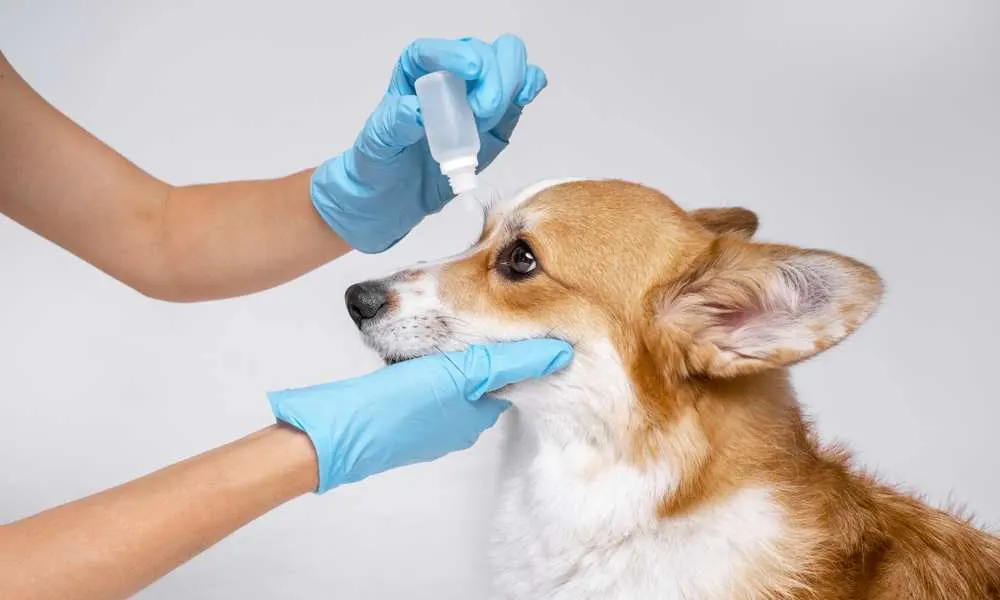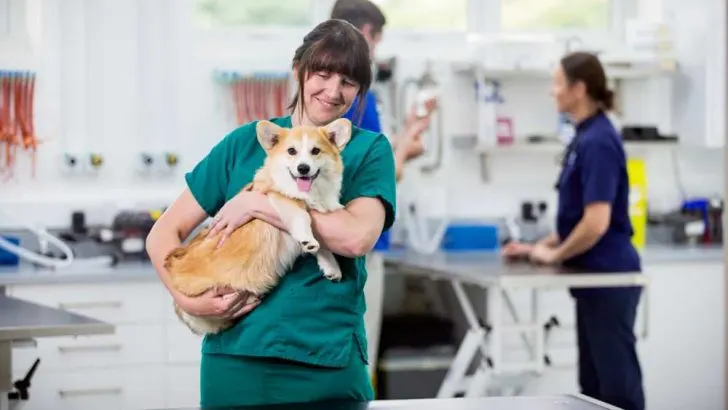It is never good seeing your dog in pain and not being able to do anything about it. While some breeds are blessed with a healthy life, others have to deal with numerous health issues during their lifetime. But this doesn’t mean that you should give up – if you care for your pet, you will do everything it takes for it to feel better.
Sometimes, dogs show back pain, and although this doesn’t look that serious to you – it is excruciating for them. If you have a corgi, this is something you should pay attention to.
You might notice that your corgi is not walking as usual and ask yourself why does my corgi arch his back? The consequences of this can be very dangerous, and that’s why you should seek medical help right away.
If your corgi has suffered from back pain for some time now and you have noticed that his back is hunched over for most of the time, stay with us, and we will explain everything you need to know about the possible dangers of this issue.

A Hunched Over Back
So, you have recently noticed that the back of your corgi is hunched over and that he shows difficulty walking. He doesn’t have that much energy anymore and refuses to walk – that’s not good at all, especially for this breed of dogs.
There is more than one cause behind this problem, and it depends on the breed of the dog and the predominant issues he faces.
The most common reasons behind a hunched over back are:
- Nausea
- Gastric dilatation-volvulus
- Anal sac disorders
- Intervertebral disc disease
- Spinal trauma
Taking only a certain breed into account – corgi dogs – hunched backs in dog breeds are the result of either intervertebral disc disease or spinal trauma.
Before getting into specific details about the two main reasons, let’s briefly mention the others.
- Nausea – if the dog has been eating the food that threatens his metabolism, he might become nauseous and start throwing up after a meal. It is essential to mention that every dog can suffer from this – the breed and age are of no importance.
- Gastric dilatation-volvulus – this is a slightly more serious condition where the stomach starts to rotate, and it is common with dogs who have a deep chest.
- Anal sac disorders – this is most commonly seen as an infection or impaction of the anal sac. It occurs when the fluid can’t be adequately released, so it piles up and creates immense tension in the dog’s organism.

Part I – Intervertebral Disc Disease
The most common reason behind a corgi with an arched back is Intervertebral Disc Disease. Let’s see what this does to your corgi.
IVDD is a disease that affects the entire spinal cord of the dog. The intervertebral discs are like two cushions that are located between the spinal vertebrates and cause immense pain. It can even lead to complete paralysis of the dog.
Unfortunately, this disease is most commonly seen in small-sized dogs – corgis, beagles, etc. The rupture of the disc can be very dangerous, and you should seek help right away.
The two most common locations where this disease occurs is in the:
- Mid-spine area (thoracolumbar)
- Neck (cervical)
In order to notice the symptoms in time, and provide your dog with the necessary care and help, pay attention to whether they show:
- Inability to walk
- Weakness
- Reduction in movement
- Food refusal
Corgis who suffer from thoracolumbar IVDD show mild or severe pain in the limbs, while those who suffer from cervical IVDD have a history of aggressive behavior because they feel immense pain in the neck area.
Intervertebral Disc Disease can be treated either surgically or non-surgically, and the results vary from dog to dog. A vet will most likely recommend undergoing surgery because the pain will last shortly than engaging in some kind of exercise treatment.
The surgery can last between one and three hours, and your corgi will either continue walking freely, or he will have to walk with the help of a mobility cart.
Don’t forget that physical rehabilitation is a crucial part of the treatment process – especially for corgis who have managed to continue walking after the surgery. It would be best if you got your corgi assessed by a proper physician who will redirect him to therapy sessions.

Part II – Spinal Trauma
Spinal trauma is connected with external injuries such as all kinds of accidents, bites, etc. Although most of the spine problems come from IVDD, spinal trauma can be caused by car trauma or infraction.
Here are some signs that will tell you that your corgi is suffering from spinal trauma:
- Shivering
- Refusing to eat or play
- Yelping
- Difficulty in bending
- Arched back
- Dragging back legs
The protocol of this disease proceeds as follows:
- History – the dog’s medical history and evidence of any injuries that occurred in the recent future.
- Stabilization – as little touching and moving of the dog as possible.
- Neurological examination – this examination is of the essence because it represents the basis for further treatment.
- Differentials – the emphasis is on minor differences in symptoms that are of great importance for further treatment.
- Radiographs – crucial for the overall spine examination.
- MRI – very useful in making a diagnosis.
- Treatment – after careful examination, the doctor prescribes a proper treatment.
- Secondary damage – if the initial treatment doesn’t go as planned, you should be prepared for a second try.
The most common solutions to this disease are:
- Surgery
- Medical management (NSAIDS)
Medication used for secondary damages include:
- Calcium channel antagonists
- Opioid agonists and antagonists
- Vitamin E
Preliminary Signs
No matter what the disease is, the only thing that matters is that you, as the owner, recognize it in time and go with your dog to the vet. When it comes to back pain in dogs, it can either develop slowly or progress at such a rate that your dog suddenly stops using his back legs completely.
If you notice some of the following signs, your dog is probably suffering from immense back pain:
- Aggressive behavior
- Being reluctant to eat, walk or play
- Being more vocal (corgis already have a loud bark)
- Excessive grooming
- Problems in breathing
- Changes to their body posture
- Shaking, shivering, trembling

Keep An Eye On This
An issue that is also very important but seems to be neglected in the recent future. Corgis are a susceptible dog breed with even more sensitive eyes – and this is something you should pay attention to.
While external injuries can spot some other diseases, this one is a little trickier. You will have to pay attention to the way your corgi moves around the house and outside. If you feel like something is wrong – go to the vet immediately.
Let’s list down the most common eye disorders in corgis.
| Epiphora | This disorder is the result of excessive tearing. Your corgi will look like he is crying most of the time. This occurs after conjunctivitis or infections. You should definitely visit the vet, and he will give you medication for this. |
| Entropion | This has to do with the lashes touching the surface of the cornea and irritating it. With this type of disorder, surgery is mostly recommended because it will surely prevent it from happening again. |
| Dermoids | This disorder occurs when large tissues of skin and hair pile up in the back of the eye. You will need to go to the vet to check because it is impossible to see with a human eye and remove it surgically. |
| Persistent Pupillary Membrane (PPM) | These are strands of the membrane that damage your corgi’s sight. Unfortunately, this is inherited. |
| Cataracts | Just like humans, corgis can also suffer from cataracts, and they are very common for this breed. This is common for older corgis, and it can be treated by medication and surgery. |
| Retinal dysplasia | You will notice this if your corgi’s eyes are folded or plucked. This progresses quickly, and it can lead to complete loss of vision. |
| Progressive retinal atrophy (PRA) | This is the progressive destruction of retinal atrophy, and it is extremely dangerous if not taken care of in time. Unfortunately, this is inherited, so you better not miss any vet’s appointments. |

Pet Insurance
You’ve probably come across a lot of advice on pet insurance. Is it a good thing or not? It’s actually a very useful thing and “a good investment” if you own a dog that is often sick, and corgis fit in this category.
Corgi as a breed of dog is not at all cheap to breed. From buying them in the first place to vaccinations and the many annual checkups that must be done, you may notice that the money from your wallet is just disappearing.
You can actually do something about this by providing your corgi with a healthy life and saving your budget by applying for pet insurance.
With pet insurance, you will save 70% to 90% of the vet bill you would have paid without this insurance.
The price depends on the state, dog, and your financial coverage. The most popular companies that offer pet insurance are:
- Pets Best
- Petplan
- Hartville pet insurance
- PetFirst
Here are examples of pet insurance costs in the following cities:
| New York | 6 months – 49$-86$ or 5 years – 66$-104$ |
| Beverly Hills | 6 months – 46$-52$ or 5 years – 62$-63$ |
TIP: Different policies have different rates.
In order to choose the right policy for your corgi, it would be best to talk to “a Pawlicy Advisor” first.
For more information on what this person does, watch this video:
Corgi Lifespan
One important aspect when choosing to apply for pet insurance is for how long will it be of use considering the age of your corgi.
An average lifespan for a corgi is 12-15 years. According to some reports, some lucky owners have had their corgis with them for almost 18 years – but these are rare cases.
According to a recent study, you are now able to calculate your corgi’s years by converting them into human years. It is based on DNA analysis.
Here is how it works:
- Your corgi’s first years = 15 human years
- Your corgi’s second year = 9 human years
- The rest of corgi’s life, 1 year = 5 years
So, the formula goes:
15 + 9 + ( 13×5 ) = 89 (human) years
Is there anything you can do to make your corgi live longer? Yes, and these are all simple things like giving them the attention they need.
A good nourishment also contributes to the lifespan of a corgi. If you provide quality food, it is likely that he will have less health problems. Your corgi’s diet should be rich with proteins since they need a lot of vitamins to make up for all the energy.
You should visit the vet regularly and follow his orders. Do not skip any tests or vaccines that are important for the health of your dog. Remember – doctor knows best.
Apart from physical exercise, corgis need to be mentally challenged from time to time. This includes exploration walks, smart toys and games you can enjoy everyday.
No matter how you choose to spend time with your dog, learn to enjoy every moment and your corgi will undoubtedly wish to stay by your side as long as possible.

Aggressive Or Affectionate?
Although a corgi is a small-sized dog, it is packed with a rich personality. A corgi can be both affectionate and aggressive at the same time, but this depends on many factors.
Corgis are extremely affectionate and cheerful dogs. This is probably the feature that makes them almost irresistible. No matter the gender, they crave an owner’s attention 24/7.
This fluffy companion is likely to follow you around all day without getting bored or exhausted. If you want to own a corgi, then you should be prepared for a lot of walking, playing, running, etc.
Corgi dogs are almost dependent on their owner, and if they feel like he is not spending enough time with them or appears distant, they can quickly develop separation anxiety.
What is this?
This is a stage in which your corgi’s overall mood and his happiness shift, and he falls into a state of “dog depression.” So, if you notice some of the following signs, your corgi is in danger of separation anxiety:
- Barking and howling without reason
- Destroying furniture around the house, breaking objects
- Self-harm (rare cases)
In order for your corgi to stay loving and affectionate, keep him interested, and give him the attention he needs – he will be grateful for it for sure.
What about aggression? Can my cute corgi become aggressive? Unfortunately, yes.
You shouldn’t take their small size for granted. They can be very aggressive at times. As a herding dog, they are used to things being their way, so it is essential that you show them who is the boss right away. It is vital to mention that aggressive nature can be both inherited and developed over time.
Bear in mind that a corgi dog is not only aggressive with you, but it can also act aggressively towards other dogs he doesn’t recognize – this can include any dog that he comes across during a walk in the park or a new pet that you have decided to bring to your household.
Female corgis tend to act a bit more aggressive than males – they are very territorial – especially if little corgis are in the picture as well.
There are numerous reasons for your corgi to act aggressively:
- Fear of something or someone
- Something is not according to their standards
- Food
- Not getting the exercise they need
- Health issues
You can either hire or professional or deal with this by yourself – no matter what you opt for, do it before your dog causes some serious trouble.

Conclusion
Your dog’s health is of the utmost importance, and regular visits to the vet should not be missed. With a breed such as a corgi, back problems are very common, and there are many reasons why they suffer from them – some inherited, and some developed over time.
Nausea, gastric dilatation-volvulus, and anal sac disorders are the most common diseases a dog faces. Still, when it comes to the corgi breed – they are prone to intervertebral disc disease and spinal trauma.
When it comes to IVDD, the discs are like two cushions located between the spinal vertebrates and cause immense pain. It can even lead to complete paralysis of the dog, and it either occurs in the mid-spine area or neck.
Spinal trauma occurs as a result of some accident or infraction. The symptoms are quite similar, and you will notice that your dog doesn’t walk as he did, shivers, yelps, or even shows signs of aggressive behavior.
The choice is up to you – you can deal with this surgically or non-surgically, but undergoing surgery would be the best and least painful way to deal with this kind of disease. As a result, your corgi will either continue to walk or have to use a mobility cart.
Corgis also suffer from various eye conditions such as cataracts, retinal dysplasia, progressive retinal atrophy, etc. In order to maintain their good sight, don’t miss the vet’s appointments.
When it comes to regular checkups and medical tests, it would be good to apply for pet insurance. Before choosing a particular policy, talk to a policy advisor and go through the requirements and prices.
A corgi dog is known for being very affectionate and loving, but it can also be aggressive when he is dealing with pain – so make sure that you take good care of your dog. The lifespan of a corgi varies between 12 and 15 years, if you are lucky – even more. In order to keep them by your side for a long time follow the doctor’s orders and feed them well.
Read Also: Why Do Corgis Roll On Their Backs?

